
News
Behind the Headlines
Two-Cents Worth
Video of the Week
News Blurbs
Articles
Testimony
Bible Questions
Internet Articles (2015)
Internet Articles (2014)
Internet
Articles (2013)
Internet Articles (2012)
Internet Articles (2011)
Internet Articles (2010)
Internet Articles
(2009)
Internet Articles (2008)
Internet Articles (2007)
Internet Articles (2006)
Internet Articles (2005)
Internet Articles (2004)
Internet Articles (2003)
Internet Articles (2002)
Internet Articles (2001)

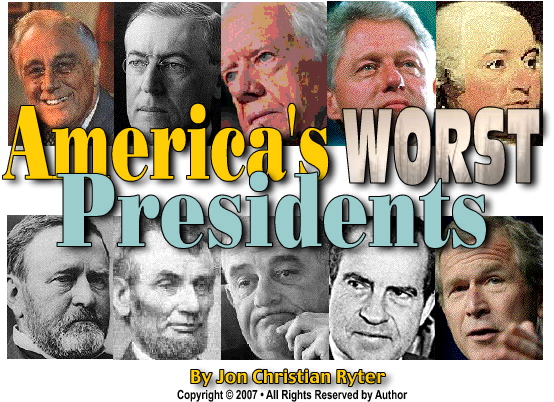

![]() n
its Feb. 26 issue, US News & World Report listed—in
their view—America's 10 worst presidents. The list, compiled by
their senior editor, Jay Tolson, from the results of 5 presidential
surveys lists the least effective presidents rather than the worst.
From that perspective, listed as the 8th least effective president was William Henry Harrison who got pneumonia just before the inauguration.
He died a month later, becoming the shortest reigning president. The
poll picked James Buchanan—the only homosexual to become
president—as the worst president because they believed that Buchanan,
who preceded Lincoln, had an opportunity to stop the spread of
slavery into the western territories but did nothing to stop it. Two
of those on Tolson's list are on my list:
n
its Feb. 26 issue, US News & World Report listed—in
their view—America's 10 worst presidents. The list, compiled by
their senior editor, Jay Tolson, from the results of 5 presidential
surveys lists the least effective presidents rather than the worst.
From that perspective, listed as the 8th least effective president was William Henry Harrison who got pneumonia just before the inauguration.
He died a month later, becoming the shortest reigning president. The
poll picked James Buchanan—the only homosexual to become
president—as the worst president because they believed that Buchanan,
who preceded Lincoln, had an opportunity to stop the spread of
slavery into the western territories but did nothing to stop it. Two
of those on Tolson's list are on my list: 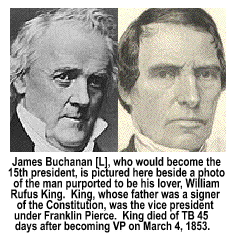 Ulysses
S. Grant and Richard Nixon. But, two of those on his "worst"
list would be on my "best" list if I had compiled one.
Ulysses
S. Grant and Richard Nixon. But, two of those on his "worst"
list would be on my "best" list if I had compiled one.
I suspect if US News & World Report compiled a list of the ten best presidents, most of those on my "worst" list would be on their best list. Before considering who would be on my "best" list, let's look at those who have done the best job of destroying the Bill of Rights or, at least, of abrogating liberty. The president who did the most to marginalize liberty in the United States was Franklin D. Roosevelt.
As the 32nd
President of the United States, Franklin D. Roosevelt's first official
act —on the day he took office—was to classify the people of
the United States as an enemy of the federal government. .jpg) This
was done by covertly rewording the Trading With the Enemy Act of 1917 within the Emergency Banking Relief Act of 1933 in order for
the bankers who crashed the stock market in 1929 and brought about a three
year recession (that FDR's manipulations converted into a decade-long
depression) to seize the gold possessed by the American people and replace
it with debt-backed paper scrip that was redeemable in nothing.
This
was done by covertly rewording the Trading With the Enemy Act of 1917 within the Emergency Banking Relief Act of 1933 in order for
the bankers who crashed the stock market in 1929 and brought about a three
year recession (that FDR's manipulations converted into a decade-long
depression) to seize the gold possessed by the American people and replace
it with debt-backed paper scrip that was redeemable in nothing.
Roosevelt created the unelected bureaucracy that swallowed the accountability factor of the US government. By blaming the bureaucracy for writing regulations that could never have been enacted by an elected legislator who had expectations of getting reelected, the politicians deflected voter accountability. Further, Roosevelt politicized the US Supreme Court in order to drive the ideological agenda of the liberal Congress. But, more than anything else, Roosevelt earned the distinction of being the worst president because, on Nov. 26, 1941 British Prime Minister Winston Churchill (in a wiretapped call taped by the Gestapo, Gestapo File #321-41) called FDR to inform him that the Japanese fleet was sailing towards Hawaii to attack the American fleet at Pearl Harbor—and asked Roosevelt to do nothing so the United States could enter the British war against the Axis without any voter backlash in the 1942 midterm election. Knowing Americans were soon going to be killed in a surprise attack, FDR boarded his private train for a belated Thanksgiving celebration in Warm Springs, Georgia. Because FDR deliberately did nothing in order to get the United States into a war America could have easily avoided, 3,219 American navy and army personnel died on Sunday, Dec. 7, 1941. Another 1,272 were wounded.
FDR climbed into bed with the globalists before World War II became World War II. On August 10, 1940 Roosevelt met Churchill in Placentia Bay off the coast of Newfoundland to divide the spoils of war at the conclusion of a world war that had not yet officially began. But more important, Roosevelt and Churchill redesigned the League of Nations by giving it a new suit of clothes and calling it the United Nations. Like the League of Nations, the UN was to be the parliament of the world—with every nation surrendering sovereignty to the Americanized League of Nations.
.jpg) The
second most infamous US president was former New Jersey governor Thomas
Woodrow Wilson. A year before the Election of 1912, Wilson became a willing pawn of the money barons by speaking out on behalf of JP Morgan and the money Mafia by suggesting that President William
Howard Taft appoint a board of savvy businessmen and bankers like Morgan to oversee the financial compass of the nation and actually
to steer the US ship-of-State.
The
second most infamous US president was former New Jersey governor Thomas
Woodrow Wilson. A year before the Election of 1912, Wilson became a willing pawn of the money barons by speaking out on behalf of JP Morgan and the money Mafia by suggesting that President William
Howard Taft appoint a board of savvy businessmen and bankers like Morgan to oversee the financial compass of the nation and actually
to steer the US ship-of-State. 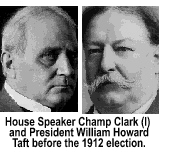 Morgan liked the so idea well enough that he sent one of his aides, Col. Edward
Mandall House to manage Wilson. The Morgan people polled
the American people several times in 1911-12 and realized that Wilson could not be elected since the polls suggested he would not rise about
40%. House Speaker Champ Clark was the Democratic favorite that
year, and would likely win the nomination. But Taft, the polls
said, was a shoo-in for reelection. Morgan and the money cartel
manipulated the election by backing every candidate that year except Eugene
V. Debs, the socialist. They secretly funded Wilson's campaign
and openly supported both Champ Clark in the primary—and their
own third party candidate, popular former president Teddy Roosevelt whom they knew would pull the conservative vote away from Taft and throw the election to Wilson. At least, that's what the honest,
in-house polls told them.
Morgan liked the so idea well enough that he sent one of his aides, Col. Edward
Mandall House to manage Wilson. The Morgan people polled
the American people several times in 1911-12 and realized that Wilson could not be elected since the polls suggested he would not rise about
40%. House Speaker Champ Clark was the Democratic favorite that
year, and would likely win the nomination. But Taft, the polls
said, was a shoo-in for reelection. Morgan and the money cartel
manipulated the election by backing every candidate that year except Eugene
V. Debs, the socialist. They secretly funded Wilson's campaign
and openly supported both Champ Clark in the primary—and their
own third party candidate, popular former president Teddy Roosevelt whom they knew would pull the conservative vote away from Taft and throw the election to Wilson. At least, that's what the honest,
in-house polls told them.
The money Mafia had a lot riding on the Election of 1912. First were the successful ratifications of the 16th and 17th Amendments that would [a] give the federal government the right to impose an income tax on the American people and [b] remove the States from the equation of federal power. That would prevent the States from killing legislation that would increase the power of the central government—and its ability to surrender the nation's sovereignty to the League of Nations whenever they felt the time was right. And second was the central bank that was promised to JP Morgan by Wilson if the governor won the White House. Morgan was determined to make sure he did. More special interest money changed hands in American politics from 1906 to 1912 than it did in any decade in the 20th century until the 1970s when TV became the expensive paid venue for delivering the political message to the voters.
Wilson sold out the United States twice during his 8-year reign. First, Congress helped the bankers violate the Constitution by surrendering their right to create the nation's money supply to private bankers. Wilson kept his promise to Morgan and signed the Federal Reserve Act of 1913 into law on Dec. 23, 1913. On Jan. 18, 1918 in an address to Congress Wilson outlined his 14 Points (which were the cornerstone of the Treaty of Versailles). The 14th point was the foundation of the League of Nations. When he and Col. House structured the 14 Points, House assured Wilson he would become the first president of the world—providing the League of Nations was ratified by the US Senate before he left office on March 3, 1921. (The Senate had already rejected the Treaty of Versailles in May, 1920 because all signatory nations would be required to surrender sovereignty and summit to the authority and jurisdiction of the League of Nations in Brussels.) Knowing the League of Nations was bad for America, Wilson still took a whistlestop train tour to sell America's yokels that it was a good deal. America never joined the League of Nations, but thanks to FDR, we got sucked into the United Nations. It's now an even worse deal—and the United States gets to get out.
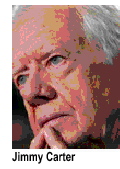 Like
most 20th century Democratic presidents, James Earl Carter had
a House and Senate controlled by his own party. Yet the 95th and 96th
Congresses were hamstrung by such intense gridlock that the Democratically-controlled
Congress could accomplish nothing. The most inept President ever to reside
at 1600 Pennsylvania Avenue was taking his direction from the globalists
at the Council on Foreign Relations. And, in doing so, Carter came close to sinking the ship-of-State. On the advise of the CFR, Carter ceded control of the Panama Canal to the to the government of Panamanian
strongman Gen. Omar Torrijos (or whomever would be in charge of
that government at midnight on December 31, 1999).
Like
most 20th century Democratic presidents, James Earl Carter had
a House and Senate controlled by his own party. Yet the 95th and 96th
Congresses were hamstrung by such intense gridlock that the Democratically-controlled
Congress could accomplish nothing. The most inept President ever to reside
at 1600 Pennsylvania Avenue was taking his direction from the globalists
at the Council on Foreign Relations. And, in doing so, Carter came close to sinking the ship-of-State. On the advise of the CFR, Carter ceded control of the Panama Canal to the to the government of Panamanian
strongman Gen. Omar Torrijos (or whomever would be in charge of
that government at midnight on December 31, 1999).
The Panama Canal Treaty required that the United States remove its military bases from the Canal Zone. In return the Torrijos government (which no longer exists—and which was deeply in debt to several international banks) promised that the United States would possess "primary access" through the Canal. American warships would receive priority over any vessels approaching the "big ditch." The one-worlders argued that this would somehow be good for the American economy and, thus, the American people. Like any good politician, Carter delayed the handover for two decades so someone else would take the flack from the American people when the giveaway of Canal took place. When the handover occurred, the People's Republic of China was standing in the wings waiting to assume control of the Panama Canal and the Canal Zone.
The CFR also advised Carter to renounce colonialism by ceding several islands which the United States has owned since World War II to Kiribati. The 13 atolls and islands, part of the Spratly island tier, were won during some of the bloodiest and most costly fighting in the Pacific campaign. In 1979, Carter quietly,—and without authorization from Congress—ceded part of the Stewart island group land masses (near Guadalcanal in the Solomon Islands to Kiribati. Carter gave away Washington Island, Fanning Island, Makin Island and Little Makin (also known as Makin Atoll). These islands, in the South China Sea, were viewed by the United States as critical to our national defense, have since been taken over by the People's Republic of China which claims the entire South China Sea as sovereign Chinese "territory."
What islands in America's security zone that Carter didn't give up in 1979 President Bill Clinton abandoned between 1997 and 1999. China, of course, was standing in the wings to assume ownership of all of America's territorial rejects, expanding China's territorial claims all the way to Hawaii. Without a shot fired, Clinton surrendered seven of nine strategic military possessions to China: Baker Island, Howland Island, Jarvis Island, Johnston Atoll, Kingman Reef, Nassau Island, and Palmyra Island. Only Wake and Midway Islands remain US territorial possessions at this time. The Stewart Islands are part of the land mass of the Hawaiian Island chain, and thus, part of our 50th State. On the advise of CFR advisor and Secretary of State Madeleine K. Albright—again, without the consent of the GOP-controlled Congress—Clinton struck the flag and deserted those islands. China raised its flag over those islands almost overnight. In the seabeds around those strategic military assets are the world's largest known oil and natural gas reserves. For Bill Clinton to cede a piece of Hawaii to China by Executive Order would be no different than having President George W. Bush cede a chunk of barren desert between El Paso and the Mexican border to Mexico believing it was okay because no one was using it at the moment. Presidents who assume power they do not constitutionally possess are rogue presidents and should be removed from office.
When Bill Clinton was impeached by the 106th Congress he should have been removed from office—not for the stained blue dress, but for violating the Hatch Act of 1939, the Pendleton Act of 1887 and the Federal Election Campaign Act of 1979 and, moreso, because the co-presidency of Bill and Hillary Clinton, abetted by Vice President Al Gore solicited—and accepted—illegal campaign contributions from the People's Republic of China, and in particular, from the intelligence arm of the People's Liberation Army.
In the winter of 1994-95, just a few months before the People's Liberation Army conspired with Gore and the Clintons to illegally and secretly contribute millions of dollars to the Democratic National Committee and the Clinton-Gore Campaign, PRC president Jiang Zemin was feted several times by the Clintons and Gore. In China, Jiang told a group of PLA generals that the United States remained China's chief enemy. A copy of Jiang's anti-US remarks made its way to a German news magazine, Der Spiegel [January 16, 1995; pg. 110]. Jiang wanted to assure his generals that even if he had to clink glasses with Western leaders, he knew who their chief enemy was.
Even after the American people discovered that the Chinese military had compromised our top secret weapons facility at Los Alamos, Congressmen and Senators from both sides of the aisle continued China's most favored nation status. Those congressional efforts were initiated after the American people learned that China had [a] secured our most advanced MX missile technology; and in 1996, just before the national elections [b] received 600 supercomputers from the United States due to a decision by the Clinton-Gore Administration—computers that, according to the Cox Report, had military implications which "...could prove valuable..." to the PLA "...by exploring US information networks, and the technologies that are associated with database warfare such as jammers, microwave weapons and anti-satellite weapons; [c] gained the extremely high tech, and very sophisticated, computer technology China needed to perfect the accuracy of their missiles systems from Loral Space Systems and Hughes Electronic who supplied that data to the PLA without a license waiver from the Defense Department, and [d] learned that in 1983, the PLA had received, from our Los Alamos lab, the blueprints to build a neutron bomb."
Add to that fact statements made as recently as April, 2000 where Jiang and other high-ranking PLA officers said they expected that, within a few years at the most, China will be engaged in a nuclear war with the United States, you have to ask why any member of the US Congress would vote for any type of trade relation with China. When you ask the question, you discover there is no logical answer—except perhaps one. The PRC and the PLA paid the Clinton Administration millions of dollars for high level access into the administration. While thousands of those dollars came through Gore's Buddhist monk outreach program, some 128 "coffees" netted about $53 million—most of which came through straw donors from Lt. Col. Chaoying Liu, the daughter of Chinese intelligence chief Gen. Huaqing Liu.
When you ask
why Congress would ignore what amounts to treason and impeach Clinton for lying about an infidelity, it's because communist China has been illegally
funding liberal Senate and Congressional candidates from as early as 1979
when Beijing began to worry that Carter's popularity had dipped
so low that not only would the Democrats lose the White House to any GOP
candidate in 1980, they would also likely lose Congress as well. Sen. Alan Cranston [D-CA] who headed the Democratic Senatorial Campaign
Committee, devoted most of his political life to defending socialism
and changing the United States into a socialist welfare state, was the
perfect conduit for the PLA. Until he retired, the PLA's largess was funneled
through the DSCC by the PLC. Unknown amounts of money was dispensed to
his fellow liberals by Cranston. 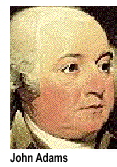 Charging Bill Clinton with treason would have opened a can of worms that
far too many elected officials in Congress could not afford. And today,
Clinton's wife wants to continue this legacy.
Charging Bill Clinton with treason would have opened a can of worms that
far too many elected officials in Congress could not afford. And today,
Clinton's wife wants to continue this legacy.
While two other presidents engaged in criminal misconduct, John Adams earned his place as the 4th worst president on my list. Adams, like most of the Founding Fathers, was a wealthy land owner (who owned much of Quincy, Massachusetts) and was part of the landed aristocracy. Unlike most American aristocrats who had wealth but no direct blood ties to any crown head of Europe, Adams was a direct descendent of King Edward I and Edward II of England.
The aristocrats
who controlled the Federalist Party believed they were entitled to privilege—and
the immunities associated with privilege. Congress enacted, and Adams signed the Aliens and Sedition Act which allowed the Adams Administration to arrest and imprison anyone who criticized his administration. The penalty
for speaking against the President of the United States was a $1,000 fine
and the seizure of all assets and property of the accused. 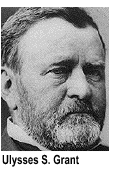 Those
accused were tried by the US Supreme Court. Sadly, that meant once convicted,
those adjudged guilty had no venue for appeal. Because Congress would
not repeal the law, the States enacted the Kentucky and Virginia
Resolves and declared the law unconstitutional, using the supra powers
of the States to nullify the law. Adams earned his spot in presidential
infamy by his willingness to bankrupt and imprison anyone who questioned
him.
Those
accused were tried by the US Supreme Court. Sadly, that meant once convicted,
those adjudged guilty had no venue for appeal. Because Congress would
not repeal the law, the States enacted the Kentucky and Virginia
Resolves and declared the law unconstitutional, using the supra powers
of the States to nullify the law. Adams earned his spot in presidential
infamy by his willingness to bankrupt and imprison anyone who questioned
him.
The chief executive of the most corrupt government in the nation's history was Ulysses S. Grant. Not only were most of the members of his administration corrupt, most of the members of both the House and Senate were corrupt. His Vice President, Schuyler Colfax, was forced to resign for accepting bribes in the Credit Mobilier scandal. Secretary of War William Belknap was also forced to resign after he was caught selling trading post franchises. Scandals also touched Treasury Secretary William Richardson who helped financiers Jay Gould and Jim Fisk corner the gold market. While his administration was corrupt, Grant was an honest soldier who died a pauper. His sin was allowing the culture of graft and corruption to take control of the federal government.
While most Americans
view Abraham Lincoln as one of the nation's greatest presidents—the
Great Emancipator—he was neither a respected national leader
nor did he free anyone. Lincoln was a pawn of the socialist Jacobin
Republicans who were attempting to overthrow the Republican form of government
created by our forefathers and replace it with a federalist system more
like that found in the socialist parliaments of Europe in which the prime
minister or president is selected by the party in power, not the people
or the States. 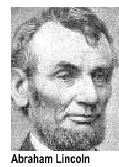 The
Republican Party, which was a hodge podge party of Free Soilers, Whigs,
Federalists and Jacobins, was a minority party at best. Had the Democrats
not been hopelessly fractionalized in 1860, Lincoln would never
have been elected since he won only 39.8% of the vote. Lincoln received 1,857.610 votes—all in the North. Not a single Southerner
voted for him. Collectively, the three Democratic presidential candidates
received 2,804,560 votes. Had there only been only one opposition candidate, Lincoln and the Jacobin Republicans would have suffered a resounding
defeat and the Civil War—if it happened at all—would not have
started in 1861.
The
Republican Party, which was a hodge podge party of Free Soilers, Whigs,
Federalists and Jacobins, was a minority party at best. Had the Democrats
not been hopelessly fractionalized in 1860, Lincoln would never
have been elected since he won only 39.8% of the vote. Lincoln received 1,857.610 votes—all in the North. Not a single Southerner
voted for him. Collectively, the three Democratic presidential candidates
received 2,804,560 votes. Had there only been only one opposition candidate, Lincoln and the Jacobin Republicans would have suffered a resounding
defeat and the Civil War—if it happened at all—would not have
started in 1861.
With the announcement of Lincoln's election, South Carolina seceded from the union. Not over the issue of slavery, but because the Jacobins succeeded in taking the White House. They feared Lincoln and the Jacobins would push for complete centralization of authority under the central government and eliminate for all time the supra-authority of the States over the federal government. While those who rewrite history single out a speech made by Confederacy Vice President Alexander Stephens—the Cornerstone Speech—as the reason the South seceded, the inaugural speech made by Jefferson Davis made it clear that the initial seven States seceded over the issue of States rights. Stephens' Cornerstone Speech was made to slave holders in Savannah, Georgia on March 21, 1861, on he even of the war, to raise money—and men—for the Confederate Army.
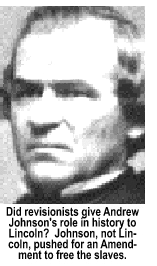 In
the Emancipation Proclamation Lincoln's pious rhetoric was intended
to inflame the slaves in the Confederate States and start a slave rebellion
that would disrupt the Confederate Army and aid the Union war effort.
Only, the proclamation freed no slaves in the North, nor did it free any
in the Confederate States that bordered a Union State. The only slaves
the Emancipation Proclamation attempted to free were those in the deep
South where the Union had no authority. Thus, no slaves were freed by
him. Lincoln's Vice President, Andrew Johnson—a Tennessean
slave owner and a Democrat—pushed Congress to enact a constitutional
amendment to free the slaves after he became the 17th President of the
United States Lincoln's legacy is one of unconstitutionally assessing
an income tax on the American people and squashing the Bill of Rights. Lincoln created what the South feared—a virtual dictatorship
over the people of the United States. From 1861 to 1865 liberty did
not exist in the United States.
In
the Emancipation Proclamation Lincoln's pious rhetoric was intended
to inflame the slaves in the Confederate States and start a slave rebellion
that would disrupt the Confederate Army and aid the Union war effort.
Only, the proclamation freed no slaves in the North, nor did it free any
in the Confederate States that bordered a Union State. The only slaves
the Emancipation Proclamation attempted to free were those in the deep
South where the Union had no authority. Thus, no slaves were freed by
him. Lincoln's Vice President, Andrew Johnson—a Tennessean
slave owner and a Democrat—pushed Congress to enact a constitutional
amendment to free the slaves after he became the 17th President of the
United States Lincoln's legacy is one of unconstitutionally assessing
an income tax on the American people and squashing the Bill of Rights. Lincoln created what the South feared—a virtual dictatorship
over the people of the United States. From 1861 to 1865 liberty did
not exist in the United States.
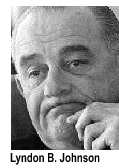 On
Nov. 22, 1963—the same day that Lyndon B. Johnson succeeded John F. Kennedy as the 36th President of the United States—the
US Senate Rules Committee chaired by B. Everett Jordan [D-NC] was
investigating Johnson in a secret session orchestrated by Attorney
General Robert Kennedy's investigation of Bobby Baker after Kennedy discovered criminal links between Baker and several
Mafia bosses. Robert
Kennedy suspected the ties went all the way to Johnson. The
Rules Committee didn't know that as they were listening to testimony about Johnson's ties with the mob that the nation was now mourning the
loss of John F. Kennedy.
On
Nov. 22, 1963—the same day that Lyndon B. Johnson succeeded John F. Kennedy as the 36th President of the United States—the
US Senate Rules Committee chaired by B. Everett Jordan [D-NC] was
investigating Johnson in a secret session orchestrated by Attorney
General Robert Kennedy's investigation of Bobby Baker after Kennedy discovered criminal links between Baker and several
Mafia bosses. Robert
Kennedy suspected the ties went all the way to Johnson. The
Rules Committee didn't know that as they were listening to testimony about Johnson's ties with the mob that the nation was now mourning the
loss of John F. Kennedy.
Because Jordon sealed the hearing, no one on the Senate Rules Committee was allowed to leave the room. Nor was anyone allowed to enter. There were no phones in the room, so no one knew that JFK had been killed. Nor did they know that man they were investigating and preparing to impeach had just become the President of the United States. Reynolds testified that he asked Baker to arrange for his boss, LBJ, to buy a life insurance policy from him.
Johnson agreed—providing Reynolds give him a $585 Magnavox Stereo. Johnson also insisted that Reynolds' agency buy $1,200 in advertising on KTFX (Ladybird Johnson's radio station). The information Jordan was really after, however, had nothing to do with petty insurance kickbacks. Jordan had after bigger fish to fry that day. The insurance kickback question was asked solely to put Reynolds at ease so he could ask the question that would force LBJ to resign the vice presidency.
History sometimes has a way of upsetting the best laid traps of man. November 22, 1963 was going to be one of those days. Reynolds told the committee he personally saw Bobby Baker give Johnson a suiticase containing $100 thousand. The kickback, he said, was for LBJ helping Baker with a lucrative deal in Fort Worth.
Reynolds then told the committee that in 1950 Johnson and Baker helped Intercontinental Hotels Corporation get some casino licenses in the Dominican Republic. Involved in this Baker-Johnson deal was Ed Levesen, Meyer Lansky and Mafia boss Sam Giancana. When the casinos opened their doors in 1955, Johnson and Baker were invited as official guests of the syndicate. According to testimony, Baker suggested that the mob use the Dominican Republic as a Mafia replacement for Cuba—which became off-limits to Americans after the Bay of Pigs.
In 1962, Baker—still serving as Johnson's chief-of-staff—formed Serv-U Corporation with Levenson. Serv-U provided vending machines to companies working under federal grants. The vending machines were made by a company owned by Giancana in Chicago.
Companies receiving "free money" from Uncle Sam were made to feel obligated to use vending machine companies recommended by the Vice President of the United States. Had Kennedy not been assassinated that day, it is very likely that Johnson would have been forced to follow Schulyer Colfax as the second veep to resign from office under a cloud. Instead, Spiro Agnew, Nixon's vice president became that person. The Senate Rules Committee was sitting on enough information that, had it all leaked out, Lyndon Johnson would have been the first president removed from office by impeachment. On December 6, 1963, LBJ called Jordan and applied just enough presidential pressure to force the Senator to "lose" the Reynolds testimony—or at least bury it deep enough to keep the information from getting into the hands of the media—for a while. Jordan assured Johnson he would do what he could to suppress the information because he said "...it might spread [to] places we don't want it to spread."
Had Kennedy not been assassinated on Nov. 22, 1962 it is very likely that the headlines in the nation's newspapers the following week would have been either the impeachment or resignation of the Vice President of the United States in disgrace.
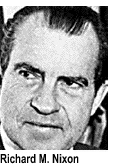 Richard
M. Nixon has already gone down in history as one of the worst presidents
because of his role in the cover-up in the Watergate scandal. Nixon made my list because he abused the authority of the Office of the President.
Not, by the way, because he was "a crook" in the LBJ or William
Jefferson Clinton sense. Nixon wiretapped his political enemies
and sanctioned the break-in of the Democratic National Headquarters at
the Watergate Hotel in Washington, DC on June 17, 1972 by operatives hired
by CREEP (Campaign to Re-Elect the President). Had FBI Director J.
Edgar Hoover not died a month earlier on May 3, 1972, its likely that
the Watergate scandal would not have been a headline event because the
odds are better than 50-50 that the break-in would have been done by active
FBI agents and not former CIA operatives working for CREEP. When Watergate
security guard Frank Willis saw lights in the office complex at
the Watergate and call the DC police, the matter would never have appeared
in print because there would have been no arrests.
Richard
M. Nixon has already gone down in history as one of the worst presidents
because of his role in the cover-up in the Watergate scandal. Nixon made my list because he abused the authority of the Office of the President.
Not, by the way, because he was "a crook" in the LBJ or William
Jefferson Clinton sense. Nixon wiretapped his political enemies
and sanctioned the break-in of the Democratic National Headquarters at
the Watergate Hotel in Washington, DC on June 17, 1972 by operatives hired
by CREEP (Campaign to Re-Elect the President). Had FBI Director J.
Edgar Hoover not died a month earlier on May 3, 1972, its likely that
the Watergate scandal would not have been a headline event because the
odds are better than 50-50 that the break-in would have been done by active
FBI agents and not former CIA operatives working for CREEP. When Watergate
security guard Frank Willis saw lights in the office complex at
the Watergate and call the DC police, the matter would never have appeared
in print because there would have been no arrests.
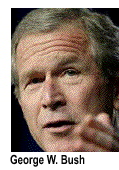 History
is not yet finished with the presidency of George W. Bush, but
it is doubtful the 43rd President will be able to redeem his presidency
sufficiently to remove his name from this list. On his first day in office, Bush established his "good guy" credentials by revoking
a series of last minute Clinton "global warming" Executive
Orders that were designed to impose a financial burden on fossil fuel-burning
American industries to encourage them to relocate their factories in exempted
third world countries where, apparently, carbon fuels don't pollute the
atmosphere. Environmentalists groups judge-shopped the DC courts and found
a Clinton judge who ruled that, in this one instance, an incoming
president cannot repeal an Executive Order of the previous president because—and
get this—his motives were purely political.
History
is not yet finished with the presidency of George W. Bush, but
it is doubtful the 43rd President will be able to redeem his presidency
sufficiently to remove his name from this list. On his first day in office, Bush established his "good guy" credentials by revoking
a series of last minute Clinton "global warming" Executive
Orders that were designed to impose a financial burden on fossil fuel-burning
American industries to encourage them to relocate their factories in exempted
third world countries where, apparently, carbon fuels don't pollute the
atmosphere. Environmentalists groups judge-shopped the DC courts and found
a Clinton judge who ruled that, in this one instance, an incoming
president cannot repeal an Executive Order of the previous president because—and
get this—his motives were purely political.
(Note for those of you who don't know this: constitutionally, Executive Orders are interdepartmental memos to employees of the Executive Branch and are binding only on those employees. The President has no legislative powers. He cannot issue any directives that obligate the people of the United States to obey him. Yet every president from Franklin D. Roosevelt has done so. On Aug. 10, 1997 President Bill Clinton issued an Executive Order banning smoking in all government office buildings throughout the United States. House Speaker Newt Gingrich sent a curt note to the White House advising the President that Executive Orders were binding only on Executive branch and he had no authority to dictate policy to the legislative branch—which had no intention of complying with the smoking ban.) Nevertheless, presidents use Executive Orders to implement legislative changes that cannot be enacted by Congress—and Congress remains mute, acting as though the White House has the authority to implement draconian changes in the rule of law to expedite the globalist agenda of the New World Order.
Much of the problem we face with illegal aliens stem from the two Clinton amnesties that granted citizenship and voting rights to illegals. Clinton was looking for Democratic voters to assure his reelection. in 1996 and Gore's election in 2000. But all the Clinton amnesties did was bring even more dangerous illegals across our borders. In the eyes of a majority of the American people, illegal aliens have become the more troublesome problem this nation faces. Yet, it is in this area that Bush-43 sold out his constituents and failed to uphold his oath of office. The Constitution of the United States mandates that the President, using US troops, protect the nations borders from invasion. We are being invaded by an army of illegals. Many of those crossing our borders are criminals intend on smuggling both people and drugs into the country. Others are illegals who, for whatever reason, cannot secure travel visas that allow them to enter the United States legally.
Rather than pursue those illegals, capture and deport them, Bush approved a scheme (at the request of the Mexican government) to pursue, capture and prosecute Border Patrol agents and law enforcement officers who zealously do their job catching the bad guys because when Border Patrol agents get tough, illegals become frightened and stop crossing the border. To date, five Border Patrol agents: David Sipe, Gary Brugman, Ignacio Ramos, Jose Compean and deputy sheriff Gilmer Hernandez were victims of malicious prosecution at the hands of Bush-43's favorite US Attorney, Johnny Sutton. All were convicted in Bush-friendly Texas federal courts, Four were sentenced. Hernandez is awaiting sentence at this time.
Bush needs to be impeached not because he attacked Islamic extremists in Iraq or Afghanistan. Those wars need to be fought—and won. Bush needs to be impeached because the Constitution of the United States requires the President to protect and seal this nation's borders. Bush is working hard to erase this nation's borders in order to merge Mexico, the United States and Canada into a stateless hegemony that can be absorbed into a global market place that can be managed by the United Nations. He has violated his oath of office and must be removed. When he is impeached, the majority and minority leadership of both the House and Senate (who favors globalization) must be impeached with him.
Bush also needs to be impeached for attempting to surrender the external sovereignty of the United States to the United Nations. First, Bush is attempting to merge the United States into a national union with Canada and Mexico, creating the North American Union, which will replicate what happened in Europe with the European Union. By dissolving its national borders, America will dilute its national identity and the power of its Constitution which would ultimately be replaced with a new Constitution modeled after the UN Declaration on Human Rights. The civil rights available under the UN's human rights covenant are conditional. Government reserves the right to withdraw or amend them whenever society feels the need to do so. The first two rights stripped from the people by every totalitarian government in history were the right to own and bear arms, and the right to free speech.
Bush is pushing Congress to enact a law to grant amnesty and legal status to somewhere between 12 to 15 million—and possibly as many as 25 million illegal aliens who are currently living in the United States. Buried in the final version of that legislation which will be signed into law will be the first legal planks of the North American Union. And, finally, Bush is pushing the Senate to ratify the Law of the Sea Treaty [LOST] that former President Ronald Reagan torpedoed in 1982. LOST will be the first true deathbed spike that will secure America's national status to its coffin. The UN will gain absolute monarchial control over 70% of the mass of the Earth—its oceans and seas, where it will become the Lord Admiralty of the Sea. The UN will regulate all sea travel, exploration and research projects, oil drilling, undersea mining—and fishing. It will have its own courts to settle all disputes, and those which are contested will be settled by the world's court of last resorts—the World Court in the Hague. No president before Bush was willing to settle for the legacy of becoming the Benedict Arnold of the 21st century.
Those who are bestowed with the honor of serving the people of the United States their national leader—and serving Congress as their voice to the rest of the world—have a sworn obligation to obey the Constitution. Even more, they have an obligation to keep their campaign promises since they are pledges that president made to secure the votes of the people. Any president who fails to uphold the Constitution, and who fails to live up to the promises they pledged to secure our votes is a dishonest leader and must be removed from office.

Copyright © 2009 Jon Christian Ryter.
All rights reserved.


